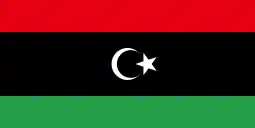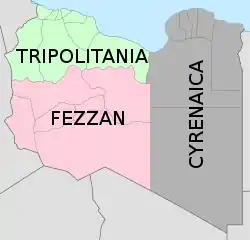Elections in Libya
On 7 July 2012, the National Transitional Council, in power since the Libyan Civil War, supervised democratic elections for a 200-member General National Congress to replace the Council.[1] The assembly was to choose a prime minister and organize parliamentary elections in 2013.[1] A process to write a constitution was also to be determined.[1] Unrest driven by armed militias, ethnic minority and radical groups undermined the process and the government for the years following the overthrowing of Muammar Gaddafi. While internal apathy towards democratic reforms slowed the process, external bodies such as the European Union were still pressing for the establishment of a national dialogue to build consensus for the drafting of a new constitution to take place before the end of 2014.[2] Parliamentary elections were scheduled to be held on 25 June 2014 in a move aimed at stabilizing the country and quelling the unrest.[3]
 |
|---|
| This article is part of a series on the politics and government of Libya |
|
|
|
|
Electoral bodies
According to Article 157 of the 2017 draft Libyan constitution, the Libyan High National Election Commission (HNEC) is responsible for organising elections of national political bodies in Libya.[4]
The Central Commission of Municipal Council Elections (CCMCE) was created in 2018 for organising municipal elections in 2018 to replace councils elected in 2014.[4] It started holding these elections in 2019 in March and April.[5][6][7][8]
2012 elections
| Party | Proportional | Constituency | Total seats | |||||
|---|---|---|---|---|---|---|---|---|
| Votes | % | Seats | Votes | % | Seats | |||
| National Forces Alliance | 714,769 | 48.14 | 39 | 0 | 39 | |||
| Justice and Construction Party | 152,441 | 10.27 | 17 | 0 | 17 | |||
| National Front | 60,592 | 4.08 | 3 | 0 | 3 | |||
| Union for Homeland | 66,772 | 4.50 | 2 | 0 | 2 | |||
| National Centrist Party | 59,417 | 4.00 | 2 | 0 | 2 | |||
| Wadi Al-Hayah Party | 6,947 | 0.47 | 2 | 0 | 2 | |||
| Moderate Ummah Assembly | 21,825 | 1.47 | 1 | 0 | 1 | |||
| Authenticity and Renewal | 18,745 | 1.26 | 1 | 0 | 1 | |||
| National Party For Development and Welfare | 17,158 | 1.16 | 1 | 0 | 1 | |||
| Al-Hekma (Wisdom) Party | 17,129 | 1.15 | 1 | 0 | 1 | |||
| Authenticity and Progress | 13,679 | 0.92 | 1 | 0 | 1 | |||
| Libyan National Democratic Party | 13,092 | 0.88 | 1 | 0 | 1 | |||
| National Parties Alliance | 12,735 | 0.86 | 1 | 0 | 1 | |||
| Ar-Resalah (The Message) | 7,860 | 0.53 | 1 | 0 | 1 | |||
| Centrist Youth Party | 7,319 | 0.49 | 1 | 0 | 1 | |||
| Libya Al-'Amal (Libya – The Hope) | 6,093 | 0.41 | 1 | 0 | 1 | |||
| Labaika National Party | 3,472 | 0.23 | 1 | 0 | 1 | |||
| Libyan Party for Liberty and Development | 2,691 | 0.18 | 1 | 0 | 1 | |||
| Arrakeeza (The Foundation) | 1,525 | 0.10 | 1 | 0 | 1 | |||
| Nation and Prosperity | 1,400 | 0.09 | 1 | 0 | 1 | |||
| National Party of Wadi ash-Shati' | 1,355 | 0.09 | 1 | 0 | 1 | |||
| Homeland Party | 51,292 | 3.45 | 0 | 0 | 0 | |||
| Other parties | 218,562 | 14.72 | 0 | 0 | 0 | |||
| Independents | – | – | – | 120 | 120 | |||
| Invalid/blank votes | 280,117 | – | – | – | – | – | ||
| Total | 1,764,840 | 100 | 80 | 120 | 200 | |||
| Registered voters/turnout | 2,865,937 | 61.58 | – | – | – | |||
| Sources: Libya Herald, POMED, HNEC | ||||||||
2014 elections
Constituent Assembly
HNEC organised the 2014 Libyan Constitutional Assembly election of 60 representatives in February 2014.[9][10][11]
House of Representatives
The Libyan election commission on 20 May 2014 announced elections would be held on 25 June 2014.[3]
Historical elections
Libya under Gaddafi
National elections were indirect through a hierarchy of people's committees. The head of government was elected by the General People's Congress. The last such election was held in March 2010.
Libya's parliament consisted of a unicameral General People's Congress. Its members were elected indirectly through a hierarchy of people's committees.
Suffrage was 18 years of age; universal and technically compulsory.
References
- Gumuchian, Marie-Louise, and Hadeel Al Shalchi. "Libyans free vote despite violence". Reuters. Retrieved 8 July 2012.
- "A European agenda to support Libya's transition". European Council on Foreign Relations. Retrieved 20 May 2014.
- "Libya to hold elections in a bid to defuse violence". Herald Globe. Archived from the original on 10 July 2014. Retrieved 20 May 2014.
- "Project Document – Libya – Local Elections" (PDF). United Nations Development Programme. 4 February 2019. Archived (PDF) from the original on 1 May 2019. Retrieved 1 May 2019.
- "Libya holds municipal elections in first vote for five years". Middle East Monitor. 31 March 2019. Archived from the original on 31 March 2019. Retrieved 20 April 2019.
- "UN envoy hails Libyans' keenness on holding municipal elections despite war". The Libya Observer. 20 April 2019. Archived from the original on 20 April 2019. Retrieved 20 April 2019.
- Alharathy, Safa (28 April 2019). "Sabha holds municipal council elections". The Libya Observer. Archived from the original on 30 April 2019. Retrieved 29 April 2019.
- "Central Committee for Municipal Elections confirms the election of six new mayors to municipal councils". The Libya Observer. 1 May 2019. Archived from the original on 1 May 2019. Retrieved 1 May 2019.
- "Constitutional assembly candidates being registered". Libya Herald. 21 October 2013. Archived from the original on 2013-10-22. Retrieved 24 December 2013.
- Elumami, Ahmed (21 February 2014). "Election re-runs next Wednesday says Elabbar". Libya Herald. Archived from the original on 2014-02-24. Retrieved 1 April 2014.
- Elumami, Ahmed (2 March 2014). "HNEC announces results for Constitutional Committee elections". Libya Herald. Archived from the original on 2014-03-10. Retrieved 3 March 2014.
